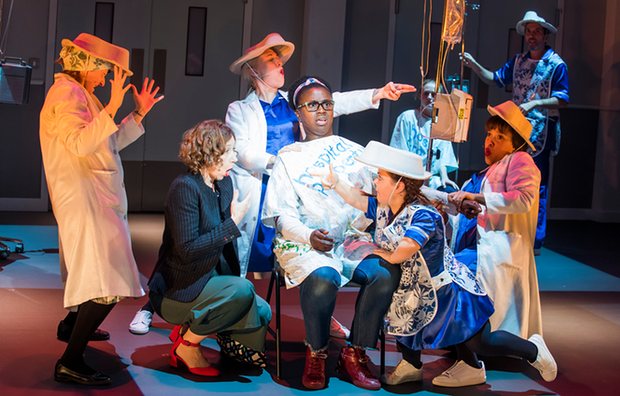Cancer.
It’s a scary word, you shouldn’t say it – mustn’t put a dampener on the conversation.
It certainly isn’t anyone’s first choice for a musical topic.
But isn’t that strange? For an illness that affects everyone on various scales, it’s so rarely spoken about in a true and honest way. Whether it be your grandparent, your friend, your sibling or you, at least one name comes to mind when someone mentions cancer.
This is why Bryony Kimmings and Complicate decided to tackle it once and for all.
And thank goodness they did.
We follow Emma (Amanda Hadingue) who is taking her baby to the hospital for a check up after some concerning results. During her time there, she is dragged through the wacky Alice In Wonderland style world of the Kingdom of the Sick. To create the physical presence of cancer, she is introduced to all-singing, all-dancing cancer cells wearing colourful, sparkly padded bubbles, giving an almost tweedle-dum, tweedle-dee vibe. They tend to lurk around and follow the cancer patients throughout. Various shaped air bags burst through the hospital doors as the show progresses, until the whole stage is taken up by monstrous cancer cells, suffocating the lives of those affected.

Emma meets a variety of cancer patients during her stay, all going through a smorgasbord of emotions. Laura (Golda Rosheuvel) is in denial about her terminal cancer, stripping off to a reveal a sparkly catsuit and singing a disco number; Rosheuvel plays her with such strength and enthusiasm that you can’t help but admire her stubborn nature. Shannon (Rose Shalloo) is another stand-out character who is waiting to find out whether her unborn child carries her cancerous gene; her head is firmly on her shoulders and she is fearless when she sings her ballad Peace of Mind.

But this show doesn’t dwell on the tragic moments; it grabs cancer by the balls through humour and anger. The ensemble song Fuck This is by far a highlight as they boldly reject society’s dictatorship over their emotions; the expectation to remain positive is slammed down, they embrace their rage and it’s beautifully enlightening. This song is led by Gia (Naana Agyei-Ampadu), a passionate, black American woman who serves as the young, feminist voice of the group; her voice is outstanding.
Admittedly, it needs a bit of tightening in parts and some ideas could be explored in a different way. For example, Mark (Hal Fowler), a lung cancer patient still very much attached to his cigarettes is a challenging character to come to terms with. Within the time given, he perhaps required some more development to aid our understanding of his story.
Nevertheless, it’s confrontational, funny and heartbreaking; near the end the fourth wall is broken and the actors begin to reveal their characters as real people. The audience are then invited to speak the name of someone they know who has been affected by cancer. The whole room murmurs for a good two minutes and it’s one of the most powerful and solidifying moments I’ve ever encountered. I’m not quite brave enough to speak the name I have in mind, but it’s there in the room and I feel a sense of peace.
I leave feeling raw, but enlightened. At first, I wasn’t sure I could face a show about a topic so close to my heart, but it truly exceeded my expectations. Theatre is there to entertain and challenge, and Complicate certainly achieved this.
If you liked this then please do subscribe to my blog and give me a follow @tesshenderson94 Check out my previous review on a play about the infamous Beastie Boys… Licensed to Ill.








